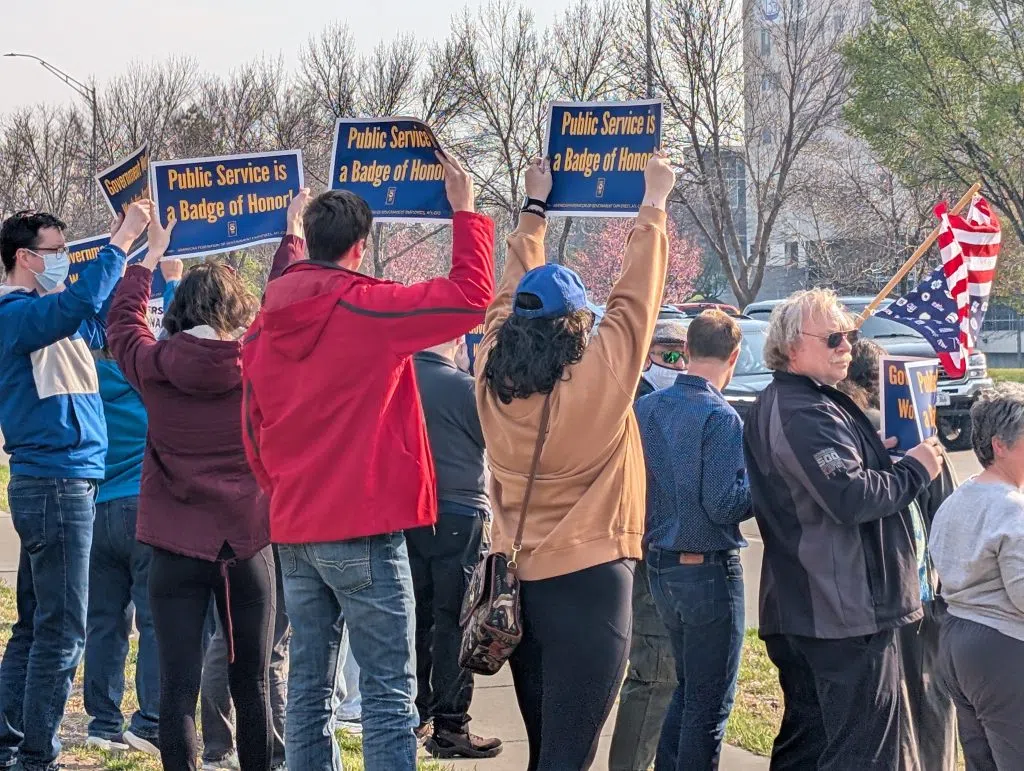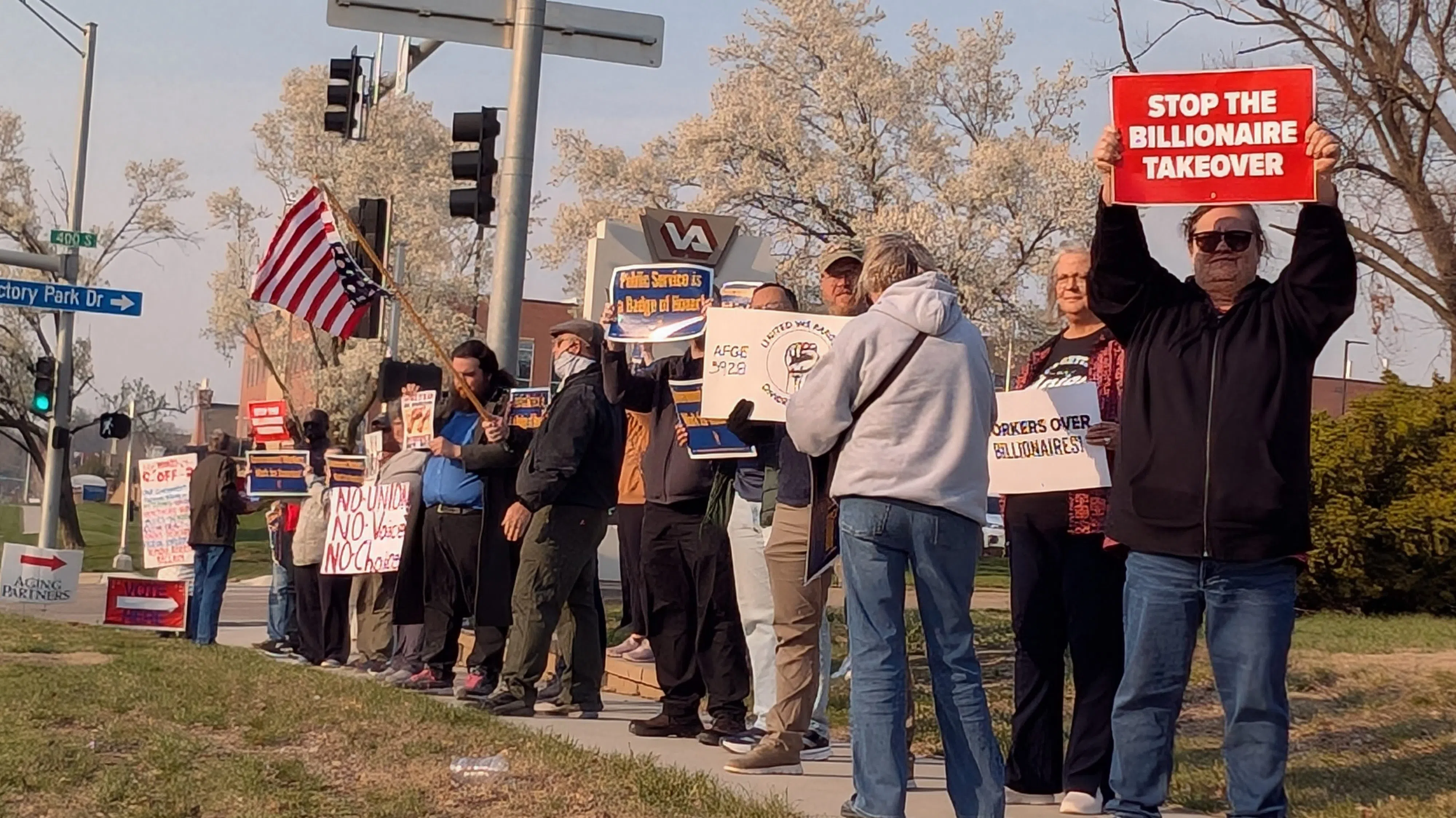Dozens of Nebraska’s federal employees rallied Tuesday outside of Lincoln’s Veterans Affairs Clinic, near 70th and “O” Street, protesting a recent executive order from President Donald Trump which excludes agencies with “national security missions” from certain protections under the Civil Service Reform Act of 1978.
In effect, this action removes collective bargaining rights for workers at more than 30 federal agencies that involve the issues of national defense, border security, foreign relations, energy security, pandemic preparedness, cybersecurity, economic defense, and public safety. Notably, law enforcement is excluded from the order.
“Hey hey! Ho ho! This union busting’s gotta go!” — the crowd chanted, fielding supportive honks from passing motorists and holding signs reading ‘Public Service is a Badge of Honor,’ ‘Government Workers Work for America,’ and ‘Workers Over Billionaires.’
Under the Civil Service Reform Act, federal unions can bargain over a limited set of conditions of employment. The Trump administration cites having to negotiate with unions over matters of performance and changes in working conditions as threats to national security and justification to removing collective bargaining rights of federal workers.
But members of the American Federation of Government Employees Local 2200, which represents VA workers in Lincoln, say Trump’s order erodes worker rights and undermines a fair process for resolving disputes.
Protesters told KLIN News that union representation protects them from being treated as “at-will employees” — meaning they can’t be fired at will, without cause. Instead, under collective bargaining agreements, workers are typically offered a “performance improvement plan” that allows time for training, feedback, and a chance to improve before facing termination.

Protesters cheered car-horn support outside Lincoln’s VA Clinic near 70th and O Street, holding signs that read, ‘Public Service is a Badge of Honor.’ (Chase Porter, KLIN News)
“They’re attacking unions because we make it harder for them to just do what they want… to just fire people at will,” said Carrie Moore, Local AFGE President. “Yet, the Trump administration didn’t ask any of the federal agencies how to make efficient cuts, they’re just doing it willy-nilly.”
This isn’t the first sparring match between President Trump and AFGE. During his first term, Trump signed the Department of Veterans Affairs Accountability and Whistleblower Protection Act of 2017, which gave then VA Secretary David Shulkin more authority to fire employees, shortened the appeals process for those firings, and prohibited employees from being paid while they pursue the appeals process. Nearly 5,000 VA employees were terminated under this law.
The Federal Labor Relations Authority found that the VA violated the law by implementing the measure without first satisfying bargaining obligations with AFGE. In 2023, the VA and the union reached a settlement to resolve ongoing litigation. Certain employees who were unjustly fired were offered their jobs back with compensation or a lump sum payment.
Rooting out “waste, fraud, and abuse” has been the tagline of Trump’s second presidency and his allyship with his opulent advisor Elon Musk, who helms the Department of Government Efficiency (DOGE). While Moore admits cost efficiencies could be found in any agency, she says Trump’s method is reckless.
“You need to go about making cuts with a scalpel and not a machete. They need to be doing it responsibly. They need to be talking to those that actually do the job. They need to be going about it slowly, carefully, and methodically,” she said. “Because they’re cutting benefits, jobs, and paychecks for real people.”
Approximately 30% of federal employees are veterans, meaning that out of roughly 2.3 million civilian federal employees, about 637,000 are veterans.
“A lot of them took these jobs because it offered flexibility. Without that, we’re harming them even further,” Moore added. “They’ve already served the country once, and they continue to serve it. That’s what we do behind the scenes every day, is take care of Nebraskans, quietly working behind the scenes.”
Republican top brass on the Senate and House Veterans’ Affairs Committees introduced a bill earlier this year loosening the threshold for veterans to access private care. According to Moore, if the VA were to be privatized, “then you start bringing money into it. Once you bring in contracts, they’re going to go with the lowest bidder, which may not always be the best thing for veterans.”
“It seems like all the policies that are coming about are really to favor billionaire contracts and privatization as opposed to protecting the workers, instead of getting us more employees to help with backlogs and take care of people every day. It’s been very obvious that we are a second thought,” said Moore.
Despite best efforts, Moore sees union power growing under Trump’s second term.
“I see us struggling a bit… but I think we’re just going to continue to grow. Our local membership increased drastically since the election out of fear,” she said. “But as we continue to fight, I think more people are going to join us because they know that we’re on their side.”
Moore called on the Lincoln community to apply pressure to Nebraska’s federal delegation.
“Deb Fischer, Pete Ricketts, Mike Flood, Adrian Smith… Don Bacon has shown his support for federal employees, we need them to do the same. We need Lincolnites to reach out to them and put that pressure on. We will continue to care for you as best we can, but we need your help.”
A spokesman for the VA tells KLIN News they will run through a deliberative process and find ways to improve care and benefits for Veterans without cutting care and benefits for Veterans. “We’re not talking about reducing medical staff or claims processors, we’re talking about reducing bureaucracy and inefficiencies that are getting in the way of customer convenience and service to veterans,” said VA Press Secretary Pete Kasperowicz.
“Meanwhile, all VA mission-critical positions are exempt from cuts, and hiring continues for more than 300,000 essential positions.”







